Best Toxic Mold Lawyers in Johannesburg
Share your needs with us, get contacted by law firms.
Free. Takes 2 min.
List of the best lawyers in Johannesburg, South Africa
About Toxic Mold Law in Johannesburg, South Africa:
Toxic mold, also known as black mold, can pose serious health risks to individuals living or working in properties affected by it. In Johannesburg, South Africa, laws exist to protect individuals from exposure to toxic mold and hold property owners accountable for addressing mold issues.
Why You May Need a Lawyer:
You may need a lawyer if you suspect that toxic mold is present in your home or workplace and the property owner is not taking appropriate action to remediate the issue. A lawyer can help you understand your legal rights, negotiate with the property owner or landlord, and take legal action if necessary.
Local Laws Overview:
In Johannesburg, property owners have a legal obligation to provide safe and habitable living or working conditions for tenants. This includes preventing and addressing toxic mold issues in a timely manner. If a property owner fails to take action to address mold problems, tenants may have legal recourse to seek compensation or force the property owner to remedy the situation.
Frequently Asked Questions:
1. What are the health risks associated with toxic mold exposure?
Exposure to toxic mold can cause respiratory issues, allergic reactions, headaches, and other health problems.
2. How can I determine if there is toxic mold in my property?
You may notice a musty smell, see visible mold growth, or experience health symptoms that could be related to mold exposure.
3. Can I hold my landlord responsible for toxic mold in my rental property?
Yes, if your landlord is aware of a mold issue and fails to address it, they may be held legally responsible for damages.
4. What should I do if I suspect toxic mold in my property?
Notify your landlord or property owner immediately and document the issue with photographs and written correspondence.
5. How long does it take to resolve a toxic mold case?
The timeline for resolving a toxic mold case can vary depending on the specifics of the situation and whether legal action is necessary.
6. Can I be evicted for reporting toxic mold in my rental property?
No, tenants are protected from retaliation for reporting unsafe living conditions, including toxic mold.
7. What evidence do I need to prove toxic mold exposure in a legal case?
Evidence may include photos of mold growth, medical records documenting health symptoms, and testimony from witnesses.
8. Can I file a lawsuit for damages related to toxic mold exposure?
Yes, if you have suffered health issues or property damage due to toxic mold exposure, you may be able to file a lawsuit seeking compensation.
9. Are there government agencies that oversee toxic mold issues in Johannesburg?
The Department of Health and local municipalities may have guidelines or regulations related to mold remediation in properties.
10. How can a lawyer help me with a toxic mold case?
A lawyer can provide legal advice, negotiate on your behalf with the property owner, and represent you in court if a lawsuit is necessary.
Additional Resources:
For more information on toxic mold laws and regulations in Johannesburg, you can contact the Department of Health or consult with legal aid organizations that specialize in housing and tenant rights.
Next Steps:
If you believe you have a toxic mold issue in your property and need legal assistance, contact a qualified attorney who has experience in handling mold-related cases. They can advise you on your rights and options for resolving the situation effectively.
Lawzana helps you find the best lawyers and law firms in Johannesburg through a curated and pre-screened list of qualified legal professionals. Our platform offers rankings and detailed profiles of attorneys and law firms, allowing you to compare based on practice areas, including Toxic Mold, experience, and client feedback.
Each profile includes a description of the firm's areas of practice, client reviews, team members and partners, year of establishment, spoken languages, office locations, contact information, social media presence, and any published articles or resources. Most firms on our platform speak English and are experienced in both local and international legal matters.
Get a quote from top-rated law firms in Johannesburg, South Africa — quickly, securely, and without unnecessary hassle.
Disclaimer:
The information provided on this page is for general informational purposes only and does not constitute legal advice. While we strive to ensure the accuracy and relevance of the content, legal information may change over time, and interpretations of the law can vary. You should always consult with a qualified legal professional for advice specific to your situation.
We disclaim all liability for actions taken or not taken based on the content of this page. If you believe any information is incorrect or outdated, please contact us, and we will review and update it where appropriate.














